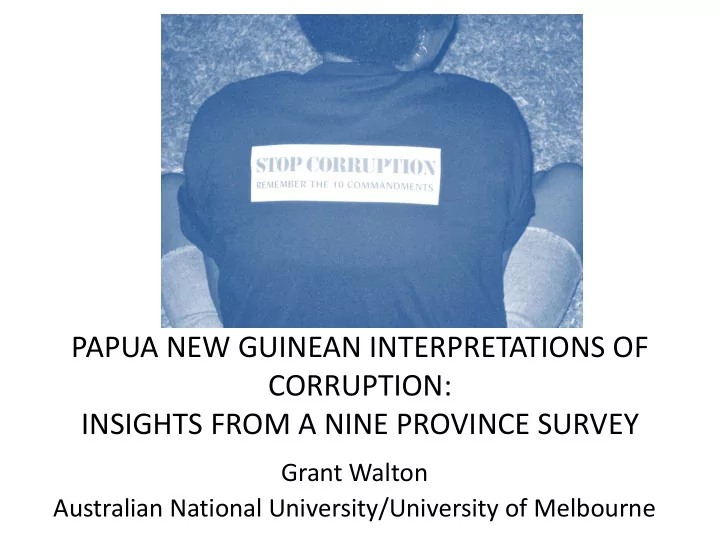

PAPUA NEW GUINEAN INTERPRETATIONS OF CORRUPTION: INSIGHTS FROM A NINE PROVINCE SURVEY Grant Walton Australian National University/University of Melbourne
• In Papua New Guinea there is a growing concern that corruption is a key impediment to development. – Government and Donors: ‘Zero Tolerance’ approach • Community support is considered a crucial part of addressing corruption • To fight corruption requires policy makers and citizens sharing an understanding about what corruption means, and how it should be addressed. • There is still little known about how Papua New Guineans interpret corruption, and why they might oppose or support it.
The Study • Purpose: To understand Papua New Guineans’ interpretations of corruption • Managed by TI PNG (Marcus Pelto, Ivan Jemen); Funding from AusAID • Field work: 2010-11 • 1825 Respondents from: Eastern Highlands, Milne Bay, Madang, National Capital District, New Ireland, Southern Highlands, West Sepik, East Sepik, and Enga. • Random selection of households in each province • Structured questionnaire: 44 questions
FINDINGS Most respondents defined corruption as a type of immorality… Best Definition of Corruption (%) Behaviour causing conflict. Offensive 7% behaviour. 8% All things that are bad and evil 26% Any immoral act. 17% The abuse of public trust for private gain. 28% The stealing of money. 16%
Institutions and Corruption: Moral and legal codes both considered very important…
We also asked about the degree nine scenarios, representing different scales and types of ‘corruption’ and wrong doing, were corrupt and harmful. • Four scenarios were: – Contractor : A contractor hands money to a public servant in order to be favoured in a contract bid (Medium to large; bribery) – Teacher: A teacher takes pens and note pads from her school stores cupboard to use for her church meetings (small scale; embezzlement) – Voter: A voter accepts an offer to sell his vote to a candidate for 50 kina (small scale; bribery) – Young woman: A young woman is drinking homebrew and selling sex (small scale; possibly immoral [and illegal] behavior)
Totally Corrupt and Harmful (%) 70 Young Woman (Small/immoral behaviour*) . 68 37 Teacher (Small/embezzlement) 39 Scenarios Totally harmful (%) Totally corrupt (%) 55 Voter (Small/Bribe) 60 50 Contractor (Med. to large/Bribe) 56 0 10 20 30 40 50 60 70 80 Percentage So, the way respondents rated these scenarios reflects the way they define corruption – it did not follow text book definitions of corruption.
Poor law enforcement and leadership were considered serious causes of corruption… Serious causes of corruption (%) Grassroots people lack info. about gov't spending 40 Low salaries 27 Leadership is of a poor quality 64 Business is willing to pay for influence with government 28 The electoral system is flawed 38 Existing laws aren’t enforced 65 The morals of people are weak 41 0 10 20 30 40 50 60 70 Percentage
Leadership: respondents indicated faith in the democratic system but not in politicians… Statements about democracy and politicians (%) There is no democracy in PNG 33% 67% Statements Politicians are not trustworthy 78% 22% Agree Disagree Politicians favour corruption 60% 40% 0% 10% 20% 30% 40% 50% 60% 70% 80% 90% 100% Percentage
Few knew how to report corruption: • Only 26% of respondents said that they knew the process to report a case of corruption. There appears to be cynicism about reporting corruption: • Out of nine statements about why respondents wouldn’t report corruption the most popular was: – ‘everybody knows about these cases and no one reports them’ (45%) – ‘The responsible parties would not have been prosecuted’ (44%)
Conclusions • Respondents’ understandings of corruption can be very different to official definitions. • There were two institutions that most strongly shaped respondents’ perceptions of corruption – the law and morality. • Poor law enforcement and leadership – particularly political leadership – were seen as key causes of corruption; • Few people knew the process for reporting corruption, and there appears to be cynicism towards reporting it.
Conclusions We need to be careful about how we interpret narratives about corruption in PNG – Are surveys reporting increased concern about corruption reflecting concern about bribery or homebrew (alcohol)? Still, the findings suggest some practical responses to address corruption: – Improve legal responses to corruption; – Increase people’s awareness about how to report, and strengthen and extend existing reporting mechanisms; – Promoting tougher rules and regulations for politicians. But these measures alone won’t meaningfully address corruption, because in PNG corruption is also determined by local moralities.
Conclusions For policy makers this means: – Understanding and responding to local moral concerns, social obligations and economic constraints. – Better communicating the negative impacts of unseen bureaucratic corruption on communities. – Overcoming citizens’ cynicism around legal enforcement and the lack of political will to tackle corruption. walton.grant@gmail.com
Recommend
More recommend